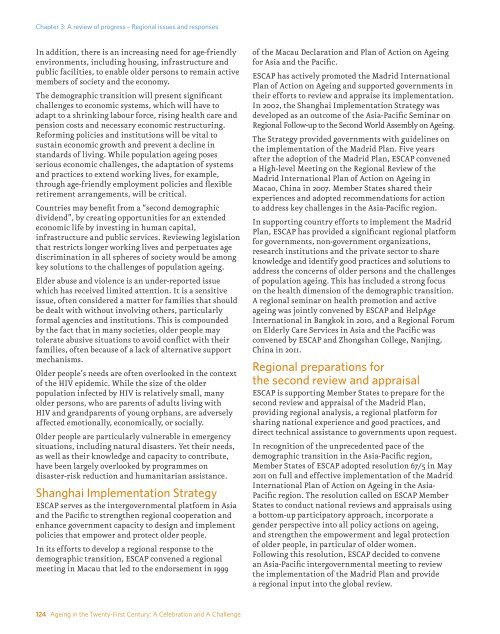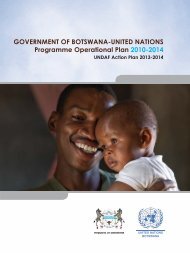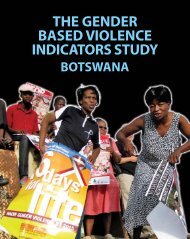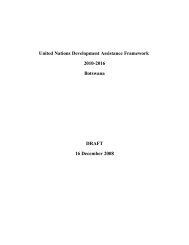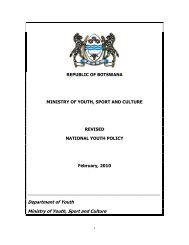Ageing in the Twenty-First Century: - HelpAge International
Ageing in the Twenty-First Century: - HelpAge International
Ageing in the Twenty-First Century: - HelpAge International
You also want an ePaper? Increase the reach of your titles
YUMPU automatically turns print PDFs into web optimized ePapers that Google loves.
Chapter 3: A review of progress – Regional issues and responses<br />
In addition, <strong>the</strong>re is an <strong>in</strong>creas<strong>in</strong>g need for age-friendly<br />
environments, <strong>in</strong>clud<strong>in</strong>g hous<strong>in</strong>g, <strong>in</strong>frastructure and<br />
public facilities, to enable older persons to rema<strong>in</strong> active<br />
members of society and <strong>the</strong> economy.<br />
The demographic transition will present significant<br />
challenges to economic systems, which will have to<br />
adapt to a shr<strong>in</strong>k<strong>in</strong>g labour force, ris<strong>in</strong>g health care and<br />
pension costs and necessary economic restructur<strong>in</strong>g.<br />
Reform<strong>in</strong>g policies and <strong>in</strong>stitutions will be vital to<br />
susta<strong>in</strong> economic growth and prevent a decl<strong>in</strong>e <strong>in</strong><br />
standards of liv<strong>in</strong>g. While population age<strong>in</strong>g poses<br />
serious economic challenges, <strong>the</strong> adaptation of systems<br />
and practices to extend work<strong>in</strong>g lives, for example,<br />
through age-friendly employment policies and flexible<br />
retirement arrangements, will be critical.<br />
Countries may benefit from a “second demographic<br />
dividend”, by creat<strong>in</strong>g opportunities for an extended<br />
economic life by <strong>in</strong>vest<strong>in</strong>g <strong>in</strong> human capital,<br />
<strong>in</strong>frastructure and public services. Review<strong>in</strong>g legislation<br />
that restricts longer work<strong>in</strong>g lives and perpetuates age<br />
discrim<strong>in</strong>ation <strong>in</strong> all spheres of society would be among<br />
key solutions to <strong>the</strong> challenges of population age<strong>in</strong>g.<br />
Elder abuse and violence is an under-reported issue<br />
which has received limited attention. It is a sensitive<br />
issue, often considered a matter for families that should<br />
be dealt with without <strong>in</strong>volv<strong>in</strong>g o<strong>the</strong>rs, particularly<br />
formal agencies and <strong>in</strong>stitutions. This is compounded<br />
by <strong>the</strong> fact that <strong>in</strong> many societies, older people may<br />
tolerate abusive situations to avoid conflict with <strong>the</strong>ir<br />
families, often because of a lack of alternative support<br />
mechanisms.<br />
Older people’s needs are often overlooked <strong>in</strong> <strong>the</strong> context<br />
of <strong>the</strong> HIV epidemic. While <strong>the</strong> size of <strong>the</strong> older<br />
population <strong>in</strong>fected by HIV is relatively small, many<br />
older persons, who are parents of adults liv<strong>in</strong>g with<br />
HIV and grandparents of young orphans, are adversely<br />
affected emotionally, economically, or socially.<br />
Older people are particularly vulnerable <strong>in</strong> emergency<br />
situations, <strong>in</strong>clud<strong>in</strong>g natural disasters. Yet <strong>the</strong>ir needs,<br />
as well as <strong>the</strong>ir knowledge and capacity to contribute,<br />
have been largely overlooked by programmes on<br />
disaster-risk reduction and humanitarian assistance.<br />
Shanghai Implementation Strategy<br />
ESCAP serves as <strong>the</strong> <strong>in</strong>tergovernmental platform <strong>in</strong> Asia<br />
and <strong>the</strong> Pacific to streng<strong>the</strong>n regional cooperation and<br />
enhance government capacity to design and implement<br />
policies that empower and protect older people.<br />
In its efforts to develop a regional response to <strong>the</strong><br />
demographic transition, ESCAP convened a regional<br />
meet<strong>in</strong>g <strong>in</strong> Macau that led to <strong>the</strong> endorsement <strong>in</strong> 1999<br />
of <strong>the</strong> Macau Declaration and Plan of Action on <strong>Age<strong>in</strong>g</strong><br />
for Asia and <strong>the</strong> Pacific.<br />
ESCAP has actively promoted <strong>the</strong> Madrid <strong>International</strong><br />
Plan of Action on <strong>Age<strong>in</strong>g</strong> and supported governments <strong>in</strong><br />
<strong>the</strong>ir efforts to review and appraise its implementation.<br />
In 2002, <strong>the</strong> Shanghai Implementation Strategy was<br />
developed as an outcome of <strong>the</strong> Asia-Pacific Sem<strong>in</strong>ar on<br />
Regional Follow-up to <strong>the</strong> Second World Assembly on <strong>Age<strong>in</strong>g</strong>.<br />
The Strategy provided governments with guidel<strong>in</strong>es on<br />
<strong>the</strong> implementation of <strong>the</strong> Madrid Plan. Five years<br />
after <strong>the</strong> adoption of <strong>the</strong> Madrid Plan, ESCAP convened<br />
a High-level Meet<strong>in</strong>g on <strong>the</strong> Regional Review of <strong>the</strong><br />
Madrid <strong>International</strong> Plan of Action on <strong>Age<strong>in</strong>g</strong> <strong>in</strong><br />
Macao, Ch<strong>in</strong>a <strong>in</strong> 2007. Member States shared <strong>the</strong>ir<br />
experiences and adopted recommendations for action<br />
to address key challenges <strong>in</strong> <strong>the</strong> Asia-Pacific region.<br />
In support<strong>in</strong>g country efforts to implement <strong>the</strong> Madrid<br />
Plan, ESCAP has provided a significant regional platform<br />
for governments, non-government organizations,<br />
research <strong>in</strong>stitutions and <strong>the</strong> private sector to share<br />
knowledge and identify good practices and solutions to<br />
address <strong>the</strong> concerns of older persons and <strong>the</strong> challenges<br />
of population age<strong>in</strong>g. This has <strong>in</strong>cluded a strong focus<br />
on <strong>the</strong> health dimension of <strong>the</strong> demographic transition.<br />
A regional sem<strong>in</strong>ar on health promotion and active<br />
age<strong>in</strong>g was jo<strong>in</strong>tly convened by ESCAP and <strong>HelpAge</strong><br />
<strong>International</strong> <strong>in</strong> Bangkok <strong>in</strong> 2010, and a Regional Forum<br />
on Elderly Care Services <strong>in</strong> Asia and <strong>the</strong> Pacific was<br />
convened by ESCAP and Zhongshan College, Nanj<strong>in</strong>g,<br />
Ch<strong>in</strong>a <strong>in</strong> 2011.<br />
Regional preparations for<br />
<strong>the</strong> second review and appraisal<br />
ESCAP is support<strong>in</strong>g Member States to prepare for <strong>the</strong><br />
second review and appraisal of <strong>the</strong> Madrid Plan,<br />
provid<strong>in</strong>g regional analysis, a regional platform for<br />
shar<strong>in</strong>g national experience and good practices, and<br />
direct technical assistance to governments upon request.<br />
In recognition of <strong>the</strong> unprecedented pace of <strong>the</strong><br />
demographic transition <strong>in</strong> <strong>the</strong> Asia-Pacific region,<br />
Member States of ESCAP adopted resolution 67/5 <strong>in</strong> May<br />
2011 on full and effective implementation of <strong>the</strong> Madrid<br />
<strong>International</strong> Plan of Action on <strong>Age<strong>in</strong>g</strong> <strong>in</strong> <strong>the</strong> Asia-<br />
Pacific region. The resolution called on ESCAP Member<br />
States to conduct national reviews and appraisals us<strong>in</strong>g<br />
a bottom-up participatory approach, <strong>in</strong>corporate a<br />
gender perspective <strong>in</strong>to all policy actions on age<strong>in</strong>g,<br />
and streng<strong>the</strong>n <strong>the</strong> empowerment and legal protection<br />
of older people, <strong>in</strong> particular of older women.<br />
Follow<strong>in</strong>g this resolution, ESCAP decided to convene<br />
an Asia-Pacific <strong>in</strong>tergovernmental meet<strong>in</strong>g to review<br />
<strong>the</strong> implementation of <strong>the</strong> Madrid Plan and provide<br />
a regional <strong>in</strong>put <strong>in</strong>to <strong>the</strong> global review.<br />
124 <strong>Age<strong>in</strong>g</strong> <strong>in</strong> <strong>the</strong> <strong>Twenty</strong>-<strong>First</strong> <strong>Century</strong>: A Celebration and A Challenge


